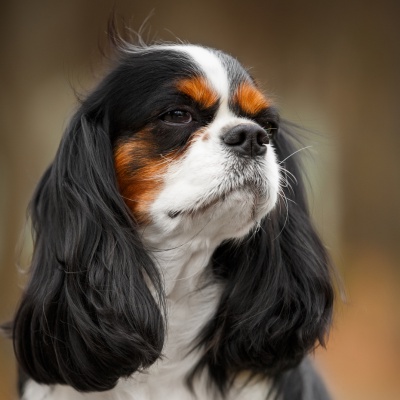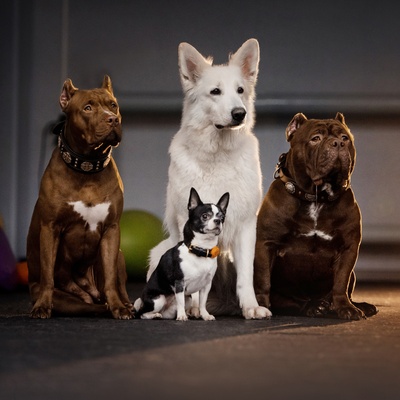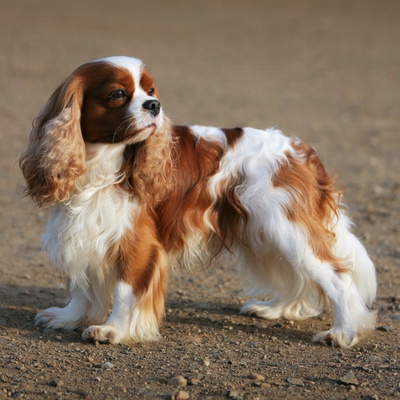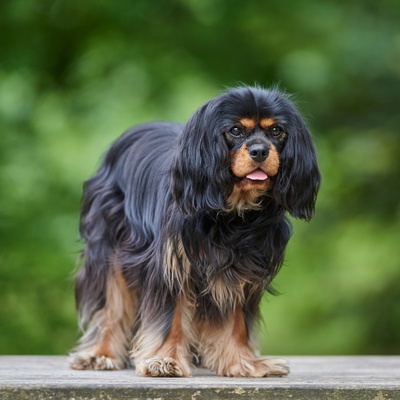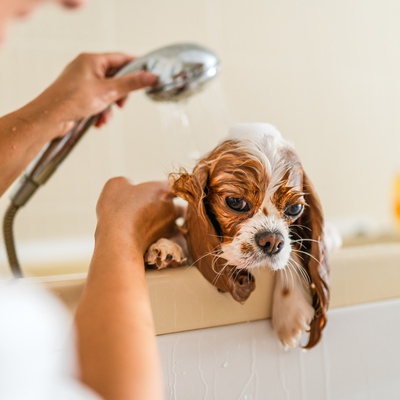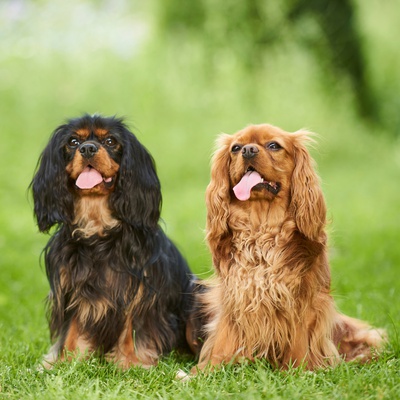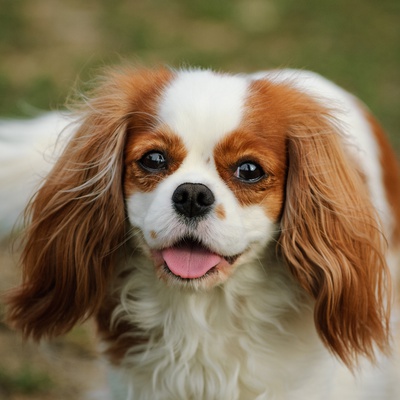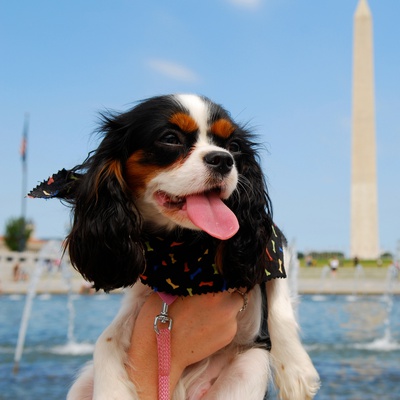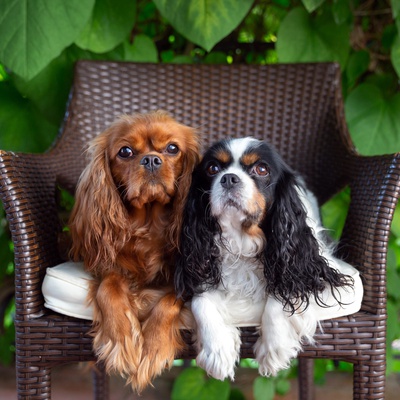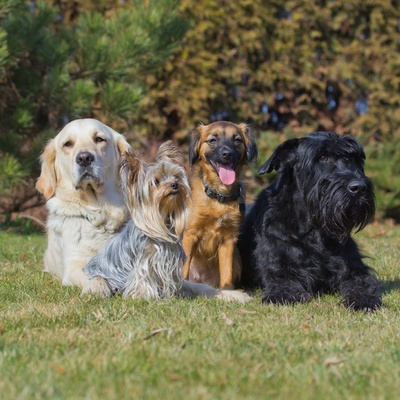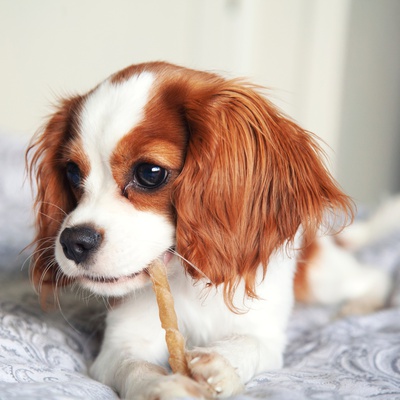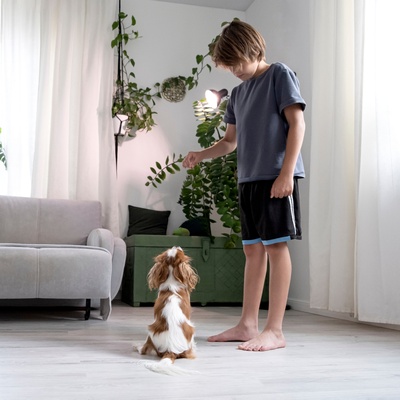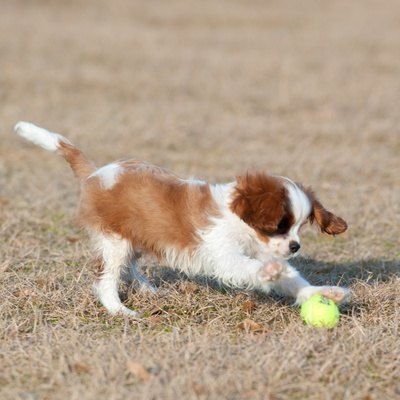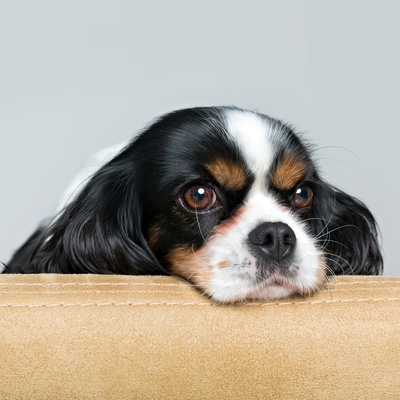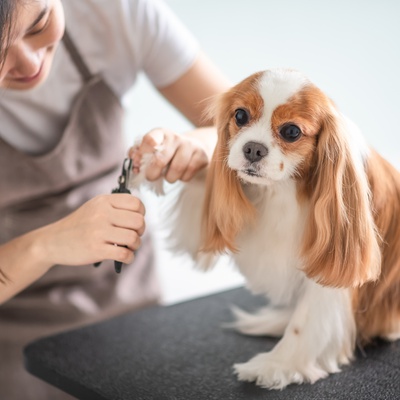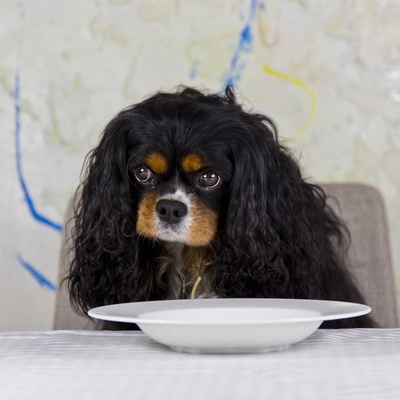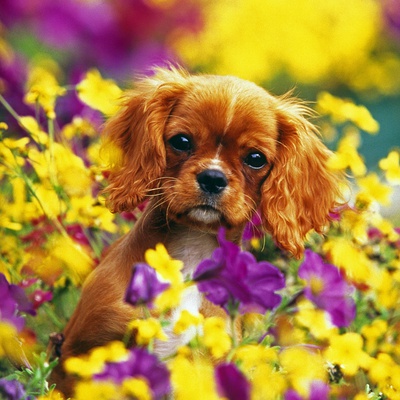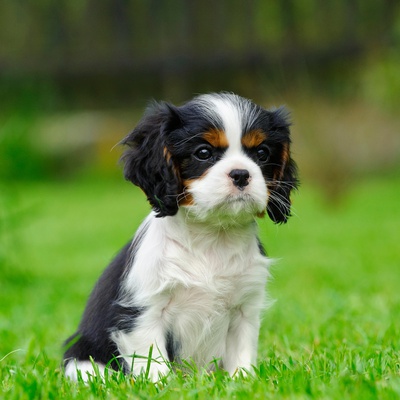Introducing the Cavalier King Charles Spaniel
Discover all there is to know about the Cavalier King Charles Spaniel : its characteristics, behavior, training, and its cost.
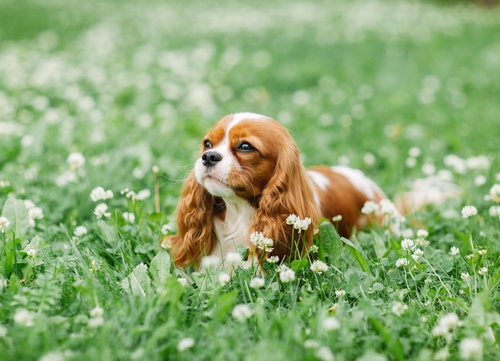
Discover all there is to know about the Cavalier King Charles Spaniel : its characteristics, behavior, training, and its cost.
The Cavalier King Charles Spaniel history is as rich and elegant as its name suggests, tracing back to the aristocratic courts of England. This breed, refined over centuries, is now cherished worldwide for its grace and affection. Known for their undying loyalty and gentle demeanor, Cavaliers excel not only as companions but also in various roles, such as therapy dogs and cherished family pets.
Their friendly and adaptable nature makes them a perfect fit for a wide range of households. With their soft, expressive eyes and an ever-wagging tail, a Cavalier King Charles offers a boundless supply of affection, proving to be a loving and devoted member of any family.
This section outlines the unique features of the Cavalier King Charles breed.
The Cavalier King Charles, a toy group member (group 9), is celebrated for its affectionate nature and ability to form close bonds, enriching lives with cheer.
The Cavalier King Charles is a petite breed. Adults stand at about 12 to 13 inches in height and weigh between 13 to 18 pounds, embodying the ideal lap dog size.
Cavaliers boast a medium-length coat that is silky and slightly wavy, providing them with an elegant appearance. Their fur requires regular grooming to maintain its lustrous look.
Coat colors in Cavaliers can range widely, including Blenheim (chestnut and white), tricolor (black/white/tan), black & tan, and ruby. These vibrant colors add to their eye-catching allure.
Cavalier King Charles are adaptable to various living environments, thriving equally in apartments and homes with gardens. They do require daily interaction and affection to stay happy.
Cavaliers are renowned for their friendly and sociable nature. They are excellent with children and other pets, often seeking out company and affection from both humans and animals alike.
Generally, the Cavalier King Charles is a robust breed, but they are predisposed to certain genetic conditions, including heart issues and syringomyelia. Regular health check-ups are essential.
With their eager-to-please attitude and intelligent minds, Cavaliers are generally easy to train. They respond best to positive reinforcement and gentle, patient training methods, reflecting their sensitive and affectionate nature.
We can help!
Every dog has its own character, and so do you. Making the right choice will ensure his well-being and yours.
Take our quiz to find out which breed is right for you, based on your personality, lifestyle, location and many other criteria.
Don't wait any longer and take the quiz to find out the answer!
The Cavalier King Charles combines elegance and compactness, with a silky coat in hues like Blenheim and tricolor, and charming features like soulful eyes and long ears.
Cavalier King Charles are the epitome of a portable breed, with females standing at about 12 to 13 inches and males at a similar range.
In terms of weight, females and males typically range from 13 to 18 pounds, embodying the perfect lap dog size. While Cavaliers grow at a moderate pace, they generally reach their full physical maturity around their first birthday, settling into their adult size and weight by then, ready to prance elegantly by your side.
The Cavalier King Charles boasts a medium-length coat that is silky and straight or slightly wavy, embodying an air of aristocratic elegance. The breed is known for its luxurious fur, with characteristic feathering on the ears, legs, tail, and chest, adding to their regal appearance. This coat texture not only highlights their beauty but also reflects their noble heritage.
The Cavalier King Charles coat comes in a captivating palette of colors, including Blenheim (chestnut and white), tricolor (black, white, and tan), black & tan, and ruby. These rich, vivid colors are distinct to the breed, making each Cavalier uniquely stunning.
Despite its royal looks, the Cavalier King Charles coat is relatively straightforward to maintain. They do shed throughout the year, with seasonal peaks, necessitating regular grooming. Brushing a few times a week helps to remove loose fur, prevent matting, and keep their coat shiny.
While they don’t require frequent baths, a monthly bath will keep their coat clean and healthy. Paying attention to the feathered areas during grooming sessions ensures these remain tangle-free and elegant.
The Cavalier King Charles is the epitome of balance and proportion in a small-bodied breed. Their head is distinctively shaped, with a slightly rounded skull and a well-defined stop, giving them a gentle, yet noble expression. The large, dark brown eyes are round and set apart, radiating warmth and intelligence, and contributing significantly to their endearing facial expressions.
Their ears are long, set high, and draped elegantly against the side of their head, framing their face perfectly. The body of the Cavalier is compact and well-muscled for its size, with a level back and a tail that is carried happily but never much above the level of the back, completing their graceful and dignified appearance.
Renowned for their loyalty, affectionate nature, and gentle disposition, Cavalier King Charles embody the quintessence of companionable pets, making them perfect for families and individuals alike.
With over 400 dog breeds recognized globally, categorized into 10 distinct groups, the diversity among canines is vast. Each group encapsulates breeds with similar functionalities and traits.
The Cavalier King Charles finds its place within the toy group, a collection that includes breeds like the Pug, Chihuahua, and Pekingese. This group is celebrated for its breeds' companionable nature, small size, and endearing personalities. Cavaliers shine within this category, showcasing their remarkable adaptability, intelligence, and an inherently sociable temperament. These qualities, coupled with their historical role as lap dogs to royalty, underscore their primary purpose: providing unwavering companionship and bringing joy to their human counterparts.
The Cavalier King Charles is celebrated for its amiable and affectionate demeanor, exuding warmth and companionship. These dogs are known for their undivided attention and profound bond with their owners, often seeking out lap cuddles and gentle interactions. The presence of an attentive and loving owner is crucial for their emotional well-being, as they thrive on companionship and dislike being left alone for long periods.
Despite their need for closeness, Cavaliers maintain a cheerful independence that endears them to all.
Cavalier King Charles are the embodiment of sociable and generous spirits, effortlessly winning hearts with their friendly and approachable nature. They exhibit remarkable sociability towards humans, making them excellent family pets and companions for individuals of all ages.
Their gentle nature and patience make them fantastic companions for children, with whom they share a special affinity. Early socialization is key to fostering their innate sociability, ensuring they grow into well-rounded and adaptable dogs, comfortable in a variety of social situations.
Take the test and find out the dog breed that matches your personality and lifestyle.
The Cavalier King Charles Spaniel showcases an impressive adaptability to various living conditions, be it a cozy apartment or a spacious house, in bustling urban settings or the tranquility of the countryside. Their primary need is the affection and attention of their owners, to whom they form deep, enduring bonds. Regular walks are essential for their well-being, with a recommended daily exercise of at least two 30-minute walks to satisfy their moderate energy levels and curiosity.
While Cavalier King Charles Spaniels are remarkably adaptable, providing them with an environment where they can explore and expend energy is beneficial. They possess a playful curiosity that thrives in both indoor and outdoor settings, appreciating secure spaces where they can roam and play. Though not as demanding in physical exercise as larger breeds, they enjoy opportunities to engage in play, explore safely in a garden, or take leisurely walks in nature, ensuring a balanced and happy lifestyle.
The Cavalier King Charles Spaniel is renowned for its quick learning capabilities and superior intelligence, making training both enjoyable and rewarding. Due to their eagerness to please and affectionate nature, they respond best to positive reinforcement techniques such as praise, treats, and play.
Although Cavaliers are generally easy to train, consistency and gentle guidance are key to nurturing their natural talents. To ensure their safety during outdoor adventures, equipping them with a GPS collar can prevent any unfortunate losses or escapes, allowing them to explore confidently within safe boundaries.
Cavaliers possess excellent listening skills, attentive to their owner's voice and commands, which enhances their trainability. This breed shows a keenness to interact and engage during training sessions, making them suitable for a variety of tasks and even competitive obedience.
Their unique character combines a gentle disposition with a curious intelligence, requiring a training approach that is both stimulating and kind. Starting socialization and training early is crucial for Cavaliers, as it helps develop their sociability and adaptability, ensuring they grow into well-mannered and confident adult dogs.
The Cavalier King Charles Spaniel is known for its generally good health but, like all breeds, requires attention and care to maintain its wellbeing.
Overall, the Cavalier King Charles Spaniel enjoys good health, though they are not without their vulnerabilities. Common predispositions in the breed include heart conditions such as mitral valve disease, as well as syringomyelia, a condition affecting the spinal cord. Eye conditions and hip dysplasia are also seen with some regularity in the breed.
Early detection and management of these conditions are crucial, contributing to a typical lifespan of 9 to 14 years for a well-cared-for Cavalier.
Regular veterinary care is paramount for the Cavalier King Charles Spaniel, encompassing vaccinations, deworming, and treatments for fleas and ticks as advised by a professional. Daily care routines should include gentle brushing of their coat to prevent mats, regular ear cleaning to ward off infections, diligent dental care to avoid gum disease, and nail trimming.
Being aware of potential allergies is important, with dietary adjustments or treatments as recommended by a vet. Cavaliers are not considered hypoallergenic, requiring owners to manage their expectations regarding allergies.
Cavalier King Charles Spaniels, like all dog breeds, thrive on a balanced diet tailored to their unique nutritional needs. Ensuring their diet is rich in proteins and packed with essential vitamins is key to maintaining their vibrant energy and overall health. Premium quality kibble, specifically formulated for small breeds, offers a solid foundation for their daily diet by providing the necessary balance of nutrients.
For Cavaliers with higher activity levels or additional protein requirements, supplementing their meals with lean cuts of white and red meat can be beneficial, though it's crucial to moderate fat intake to prevent weight gain and maintain optimal health.
The sought-after Cavalier King Charles Spaniel is prized for its companionship, with numerous breeders; careful consideration is essential to match lifestyle and needs.
When considering the adoption of a Cavalier King Charles Spaniel, it’s crucial to make an informed decision. Selecting a reputable breeder is paramount; a visit to the premises will allow you to observe the puppies' living conditions and behavior. It's essential to inquire about the health of the puppy and its parents, seeking transparency on any hereditary conditions.
Lastly, mandatory electronic identification, like microchipping, is not always mandated at the federal level in the United States for cats and dogs. But microchipping is widely acknowledged as a successful way to permanently identify pets and increase the possibility of reuniting lost pets with their owners, even in the absence of universal regulations. As a pet owner, it is advised to inform yourself about municipal laws to ensure the safety and wellbeing of your pet.
The cost of acquiring a Cavalier King Charles Spaniel can vary greatly, influenced by factors such as the dog's lineage, pedigree, the breeder's reputation, and the age of the dog. Typically, the price for a Cavalier King Charles Spaniel puppy ranges from
to
.
However, owning a Cavalier involves additional financial commitments, including food, healthcare, and grooming. The estimated annual cost of maintaining a Cavalier King Charles Spaniel can be around
to
, depending on the level of care provided.
